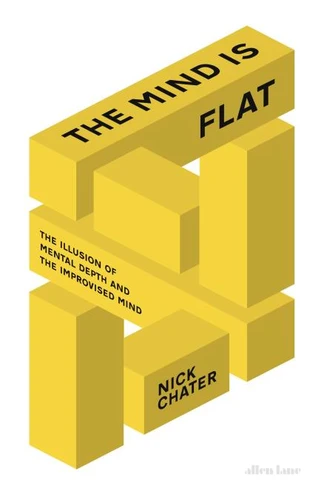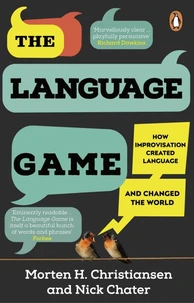The Mind is Flat. The Illusion of Mental Depth and The Improvised Mind
Par :Formats :
Disponible dans votre compte client Decitre ou Furet du Nord dès validation de votre commande. Le format ePub protégé est :
- Compatible avec une lecture sur My Vivlio (smartphone, tablette, ordinateur)
- Compatible avec une lecture sur liseuses Vivlio
- Pour les liseuses autres que Vivlio, vous devez utiliser le logiciel Adobe Digital Edition. Non compatible avec la lecture sur les liseuses Kindle, Remarkable et Sony
- Non compatible avec un achat hors France métropolitaine
 , qui est-ce ?
, qui est-ce ?Notre partenaire de plateforme de lecture numérique où vous retrouverez l'ensemble de vos ebooks gratuitement
Pour en savoir plus sur nos ebooks, consultez notre aide en ligne ici
- Nombre de pages320
- FormatePub
- ISBN978-0-241-20876-2
- EAN9780241208762
- Date de parution29/03/2018
- Protection num.Adobe DRM
- Infos supplémentairesepub
- ÉditeurPENGUIN
Résumé
A radical reinterpretation of how your mind works - and why it could change your life 'An astonishing achievement. Nick Chater has blown my mind' Tim Harford'A total assault on all lingering psychiatric and psychoanalytic notions of mental depths ... Light the touchpaper and stand well back' New StatesmanWe all like to think we have a hidden inner life. Most of us assume that our beliefs and desires arise from the murky depths of our minds, and, if only we could work out how to access this mysterious world, we could truly understand ourselves.
For more than a century, psychologists and psychiatrists have struggled to discover what lies below our mental surface. In The Mind Is Flat, pre-eminent behavioural scientist Nick Chater reveals that this entire enterprise is utterly misguided. Drawing on startling new research in neuroscience, behavioural psychology and perception, he shows that we have no hidden depths to plumb, and unconscious thought is a myth.
Instead, we generate our ideas, motives and thoughts in the moment. This revelation explains many of the quirks of human behaviour - for example why our supposedly firm political beliefs, personal preferences and even our romantic attractions are routinely proven to be inconsistent and changeable. As the reader discovers, through mind-bending visual examples and counterintuitive experiments, we are all characters of our own creation, constantly improvising our behaviour based on our past experiences.
And, as Chater shows us, recognising this can be liberating.
For more than a century, psychologists and psychiatrists have struggled to discover what lies below our mental surface. In The Mind Is Flat, pre-eminent behavioural scientist Nick Chater reveals that this entire enterprise is utterly misguided. Drawing on startling new research in neuroscience, behavioural psychology and perception, he shows that we have no hidden depths to plumb, and unconscious thought is a myth.
Instead, we generate our ideas, motives and thoughts in the moment. This revelation explains many of the quirks of human behaviour - for example why our supposedly firm political beliefs, personal preferences and even our romantic attractions are routinely proven to be inconsistent and changeable. As the reader discovers, through mind-bending visual examples and counterintuitive experiments, we are all characters of our own creation, constantly improvising our behaviour based on our past experiences.
And, as Chater shows us, recognising this can be liberating.
A radical reinterpretation of how your mind works - and why it could change your life 'An astonishing achievement. Nick Chater has blown my mind' Tim Harford'A total assault on all lingering psychiatric and psychoanalytic notions of mental depths ... Light the touchpaper and stand well back' New StatesmanWe all like to think we have a hidden inner life. Most of us assume that our beliefs and desires arise from the murky depths of our minds, and, if only we could work out how to access this mysterious world, we could truly understand ourselves.
For more than a century, psychologists and psychiatrists have struggled to discover what lies below our mental surface. In The Mind Is Flat, pre-eminent behavioural scientist Nick Chater reveals that this entire enterprise is utterly misguided. Drawing on startling new research in neuroscience, behavioural psychology and perception, he shows that we have no hidden depths to plumb, and unconscious thought is a myth.
Instead, we generate our ideas, motives and thoughts in the moment. This revelation explains many of the quirks of human behaviour - for example why our supposedly firm political beliefs, personal preferences and even our romantic attractions are routinely proven to be inconsistent and changeable. As the reader discovers, through mind-bending visual examples and counterintuitive experiments, we are all characters of our own creation, constantly improvising our behaviour based on our past experiences.
And, as Chater shows us, recognising this can be liberating.
For more than a century, psychologists and psychiatrists have struggled to discover what lies below our mental surface. In The Mind Is Flat, pre-eminent behavioural scientist Nick Chater reveals that this entire enterprise is utterly misguided. Drawing on startling new research in neuroscience, behavioural psychology and perception, he shows that we have no hidden depths to plumb, and unconscious thought is a myth.
Instead, we generate our ideas, motives and thoughts in the moment. This revelation explains many of the quirks of human behaviour - for example why our supposedly firm political beliefs, personal preferences and even our romantic attractions are routinely proven to be inconsistent and changeable. As the reader discovers, through mind-bending visual examples and counterintuitive experiments, we are all characters of our own creation, constantly improvising our behaviour based on our past experiences.
And, as Chater shows us, recognising this can be liberating.





